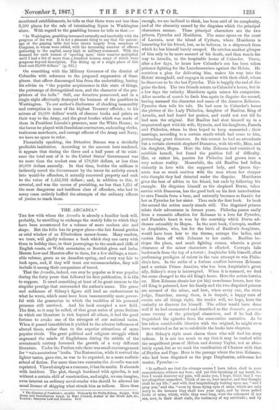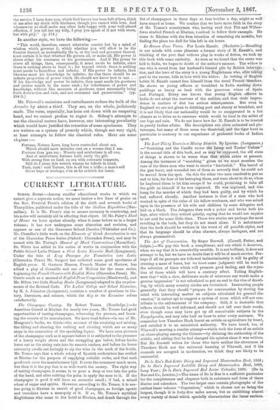THE ARCADIA.*
TnE few with whom the Arcadia is already a familiar book will, probably, be unwilling to exchange the stately folio to which they have been accustomed for a volume of more modern size and .shape. But the folio has its proper place—the fair formal garden +31. oriel window of an Elizabethan manor-house. Many readers, we trust, will gladly welcome a book which they can carry with them in holiday time, in their journeyings to the sands and cliffs of English coasts, or Welsh mountains, or Scottish glens and lochs. Messrs. Low and Marston offer to them, for a few shillings, a tract- able volume, green as an Arcadian spring, and every way fair to look upon, and, if they will trust our recommendation, they will include it among their companions of travel.
• That the Arcadia, indeed, can ever be popular as it was popular during the forty years that followed its first publication, it is idle to suppose. It owed something at least of its great success to the singular prestige that surrounded the author's name. The grace and nobleness of Sidney's figure still lend an enchantment to what he wrote, which must have been immeasurably more power- ful with the generation in which the tradition of his personal presence still survived. And his book occupied a new field. The first, as it may be called, of that great series of prose fictions in which our literature is rich beyond all others, it had the good fortune to awake one of the strongest of our national tastes. When it passed into oblivion it yielded to the adverse influences of -altered times, rather than to the superior attractions of more popular rivals. The great political and religious struggle which engrossed the minds of Englishmen during the middle of the seventeenth century favoured the growth of a very different literature. Under the Puritan rule there was small encouragement for "vain amatorious " books. The Restoration, while it revived the lighter tastes, gave rise, as was to be expected, to a more realistic school of fiction. For more than two centuries the Arcadia was not reprinted. Viewed simply as a romance, it has its merits. It abounds with incident. The plot, though burdened with episodes, is not without a certain skill of construction, and might, we can imagine, even interest an ordinary novel-reader who should be allowed his usual licence of skipping what struck him as tedious. More than
* The Couniest of Pembroke's Arcadia. Written by Sir Philip Sidney, Knight. With Notes and Introductory Essay, by Hain Primal, Author of the Gentle Lire, &a., London : Sampson Low and Marston. 1837.
enough, we are inclined to think, has been said of its complexity, and of the obscurity caused by the disguises which the principal characters assume. These principal characters are the two princes, Pyrocles and Musidorus. The scene opens on the coast of Laconia, near the island of Cythera, where .Musidorus is lamenting for his friend, lost, as he believes, in a shipwreck from which he has himself barely escaped. He catches another glimpse of him only to be more assured of his death, and then wends his way to Arcadia, to the hospitable house of Calander. There, after a few days, he hears how Calander's son has been taken prisoner fighting for the Lacechemonians against the Helots. He contrives a plan for delivering him, makes his way into the Helots' stronghold, and engages in combat with their chief, whom he discovers to bo the lost Pyrocles. This is happily the end of dis- guise the first. The two friends return to Calander's house, but in a few days the unlucky Musidorus again misses his companion. After months of search he finds him again in disguise the second, having assumed the character and name of the Amazon Zelmano. Pyrocles then tells his tale. He had seen in Calander's house the picture of the Lady Philoclea, daughter of Basilius, King of Arcadia, and had heard her praises, and could not rest till he had seen the original. But Basilius had shut himself up in a sequestered spot with his wife, Gynecia, and his daughters, Pamela and Philoclea, whom he thus hoped to keep unmarried ; their marriage, according to a certain oracle which had come to him, portending great disasters. In this retreat he had no attendants but a certain clownish shepherd Damoetas, with his wife, Miso, and his daughter, Mopsa. Here the false Zelmane had contrived to
establish herself, but found the position full of difficulty. Her, or rather his, passion for Philoclea had grown into a
very serious reality. Meanwhile, the old Basilius had fallen violently in love with the supposed lady, and Queen Gy- necia was as much smitten with the man whom her sharper wits thought they had detected under the disguise. Musidorus gives the best of advice to his friend, but ends by following his example. He disguises himself as the shepherd Dorus, takes service with Damcetas, has the good luck on his first introduction to save Pamela from a bear, and naturally becomes as frantic for her as Pyrocles for her sister. Thus ends the first book. In book the second the action nearly stands still. The disguised princes relate their adventures in former years. Philoclea passes easily
from a romantic affection for Zelmane to a love for Pyrocles, and Pamela's heart is won by the courtship which Dorus ad- dresses ostensibly to Mopsa. In the next book, Cecropia, mother to Amphialus, who, but for the birth of Baellius's daughters,
would have been heir to the throne, entraps the ladies, and carries them off with Zelmane to her castle. Basilius be-
sieges the place, and much fighting ensues, wherein a great clearance of the minor characters is effected. Cecropia falls
backwards from the top of a tower ; Amphialus kills himself, after performing prodigies of valour in the vain attempt to win Philo- cleft's love. In the midst of a furious conflict between Zelmane and a certain Prince Anaxius, who has been Amphialus's great ally, Sidney's story is interrupted. When it is resumed, we find the scene changed to the old King's home. Here the action hurries on. How Zelmane cheats her (or his) unwelcome lovers, how the old King is poisoned, how his family and the two disguised princes are accused of the crime, and how, when every one, the stern judge, Euarchus, among them, is in despair, a happy turn of events sets all things right, the reader will, we hope, have the curiosity to discover for himself. The editor would have done well if he had enumerated and described as the dramatis persons some twenty of the principal charaters, and if he had dis- tinguished the episodes from the consecutive narrative. As he has taken considerable liberties with the original, he might even have ventured so far as to subdivide the books into chapters.
But Sidney's style must charm those who will find his story tedious. It is not too much to say that it may be ranked with the magnificent prose of Milton and Jeremy Taylor, not as abso- lutely equal, but as we rank the versification of Chaucer with that of Dryden and Pope. Here is the passage where the true Zelmane, who had been disguised as the page Daiphantus, addresses her master, Pyrocles
"It sufficeth me that the strange course I have taken shall to your remembrance witness my love; and yet this breaking of my heart, be- fore I would discover my pain, will make you, I hope, think that I was not altogether nnmodest. Think of me so, dear master, and that thought shall be my life ;" and with that languishingly looking upon me, "and I pray you," said she, "even by these dying eyes of mine, which are only sorry to die because they shall lose your sight, and by these polled locks of mine, which, while they were long, were the ornament of my I sex, now, in their short curls, the testimony of my servitude ; and by • the service I have done you, which God knows has been full of love, think of me after my death with kindness, though you cannot with love. And whensoever ye shall make any other lady happy with your well placed affection, if you tell her my folly, I pray you speak of it not with scorn, but with pity." (p. 214.) In another style, we have the following :— " This world, therefore, cannot otherwise consist but by a mind of 'wisdom which governs it, which whether you will allow to be the Creator thereof, as undoubtedly He is, or the soul and governor thereof, most certain it is that whether He govern all, or make all, His power is above either his creatures or his government. And if His power be above all things, then, consequently, it must needs be infinite, since there is nothing above to limit ; for beyond which there is nothing must needs be boundless and infinite. If His power be infinite, then likewise must his knowledge be infinite ; for else there should be an
infinite proportion of power which He should not know how to . . H his knowledge and power be infinite, then must needs his goodness and justice march in the same rank ; for infiniteness of, power and knowledge, without like measure of goodness, must necessarily bring forth destruction and ruin, and not ornament and preservation." (pp. 284-5.)
Mr. Friswell's omissions and curtailments reduce the bulk of the Arcadia by about a third. They are, on the whole, judiciously made. The verse, especially, has been cut down with an unsparing hand, and we cannot profess to regret it. Sidney's attempts to use the classical metres have, however, one interesting peculiarity which would have justified the retention of some specimens. They are written on a system of prosody which, though not very rigid, at least attempts to follow the classical rules. Here are some elegiacs :- Fortune, Nature, Love, long have contended about me,
Which should most miseries cast on a worme that I am. Fortune thus 'gan say: Miserie and misfortune is all one, And of misfortune, fortune bath onely the gift.
With strong foes on land, on sea with contrarie tempests, Still do I cross this wretch whets° he taketh in hand. Tush, tush! said Nature, this is all but a trifle ; a man's self Gives haps or mishap; e'en as he ordreth his heart.































 Previous page
Previous page